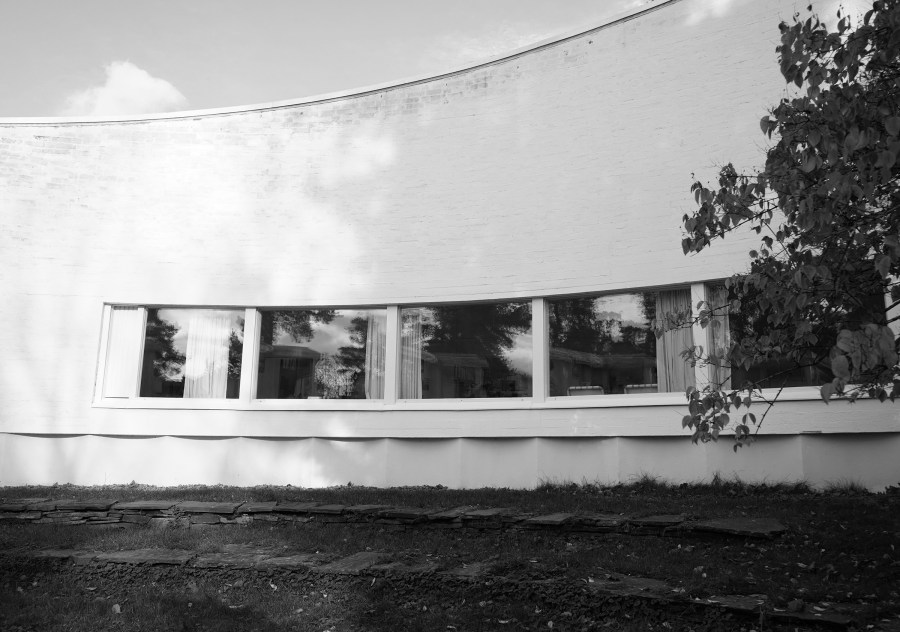This time last year, as the autumn leaves were falling and the temperature was just starting to dip, I went on a little city break in Helsinki, Finland. Armed with my camera, I immediately made a pilgrimage to my favourite building in the whole world – Alvar Aalto’s Studio – but I realised that I sadly never shared my images on here.
So I thought I would do so in today’s blog post; after all, who wouldn’t want to be inspired by Alvar Aalto’s warm, tactile, sensorial interiors? Especially when captured with the beautiful, soft glow of Nordic light. I know I’m taking heaps of inspiration for my own extension project.
I first visited Alvar Aalto’s House and nearby Studio back in 2011 as an architecture student. During that trip, I also paid a visit to Aalto’s hometown of Jyväskylä – so called ‘Alvar Aalto’s capital’ due to the high number of buildings by the famous architect, including the Alvar Aalto museum, Muurame church and Säynätsalo town hall. It’s also where he went to school and later started a family. A few years later, I visited another of his building’s – Maison Louis Carré – which I featured in a blog post here.
I’m in awe of Aalto’s mastery of light; he seemed to be able to create spaces that simply glowed from within. Aalto was able to make large spaces feel intimate and gave functional interiors a cosy, homely quality. He really put the user first, considering all the little details that would come together to create a complete environment, from lighting and materials to the door handles and furniture. I’ve been to Alvar Aalto’s House and Studio a number of times now and each time I notice something new; whether it’s how the different seasons influence the feel of the space, or whether it’s little moments that had previously passed me by.
All images Cate St Hill


Alvar Aalto designed Studio Aalto in 1955, unusually choosing the quiet, residential area of Munkkiniemi for his own architecture office over the city centre. Rather conveniently, it’s only a short walk from Aalto’s house on nearby Riihitie.
The white-rendered building was carefully arranged so employees and clients would transition through a series of small, functional spaces, before being greeted by the Studio’s wow moment – the light-filled, curved studio that looks onto the garden’s amphitheatre. It’s a clever architectural trick – if you move from a dark space to a light space, the lighter space will always feel bigger and brighter. The guided tour takes you on a similar path and it really does take your breath away when you finally walk into the double-height studio.




On the ground floor of Alvar Aalto’s Studio is arranged a modest entrance, a cloakroom, the Alvar Aalto Foundation offices, and a small dining room, nicknamed the ‘Taverna’, that was added later in 1962-63. Walk upstairs and you come to a bright office space with workspaces and drawing desks divided by simple, white room partitions. Light fills the studio from windows on either side of the narrow, rectangular room, creating an inspiring, democratic space to work and create.
This is where Aalto ran his office until his death in 1976, before it was continued by Elissa Aalto until 1994. The space is still used by the Alvar Aalto Foundation staff for research purposes and the architectural preservation of Aalto buildings.
Adjacent to this office space is a conference room with a skylight that would cast light down on architectural models and drawings that needed reviewing. You can still see the rows of boxes that would hold rolls of drawings, but they’re now all held in Jyväskylä for safe keeping.




Now onto the main event – the studio’s curved hall, which functioned as meeting place, an exhibition space and Aalto’s workspace.
The white horizontal battens on the walls were used to hang drawings and display work. They also encouraged climbers to sprawl up the far wall, bringing an element of the outside world into the white-washed space. A clever addition to the space is the little mezzanine in the corner, created so that Aalto and his colleagues could suspend lighting prototypes and view them from below.
Alvar Aalto always made sure there was a strong connection between inside and out, whether that was with warm, natural materials or the positioning of views. The curved wall in the studio is lined with picture windows framing a cinematic vista of the garden. The amphitheatre outside would be used by staff for lectures or to watch slide shows that would be projected onto the white wall opposite. I love how the curves are mirrored in the sinuous line of Aalto’s plywood furniture. It makes the space feel fluid and alive. It really is the most special place.






You can visit Studio Aalto by guided tour only. It is recommended to book in advance – tours take place Tuesdays to Sundays and cost €20. More information here.









